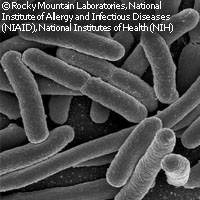Bacteria mutate much more than previously thought
Researchers from the Gulbenkian Institute of Science in Portugal have found that beneficial mutations in the bacterium Escherichia coli (E. coli) occur 1,000 times more frequently than previously predicted. Beneficial mutations allow bacteria to thrive in a new environment. The team also discovered that many more genes mutate during bacteria's adaptation to a new environment than was previously thought. The findings, published in the journal Science, could explain why bacteria are so quick to develop resistance to antibiotics, say the authors. 'This study is a substantial contribution to the understanding of a central problem in the theory of evolution and has important implications for public health, more specifically for the understanding of antibiotic resistance and the development of new medicines against bacteria,' team leader Isabel Gordo told the Portuguese News Agency Lusa. In their study, the researchers measured the mutation rate of the common bacterium Escherichia coli in various size populations. They looked at populations small enough to avoid 'clonal interference' (a clone carrying a beneficial mutation), but big enough to avoid disadvantageous mutations, which spread too easily and kill the bacteria population. Through comparing these various sized populations, ranging from 20,000 cells to 10 million, the researchers discovered that the rate of mutation of E.coli was a thousand times higher than previously predicted, and that thousands of mutations that could lead to modest increases in bacteria strength were going unseen because good mutations were being superceded by better ones. According to the researchers, although the study was done on Escherichia coli, a common bacterium found in the intestine of vertebrates, including humans, the research could potentially apply to any bacteria. The results will therefore be of particular importance for the study of disease-inducing bacteria. Moreover, the study could have implications for the way in which evolution itself is understood, say the researchers.
Countries
Portugal



